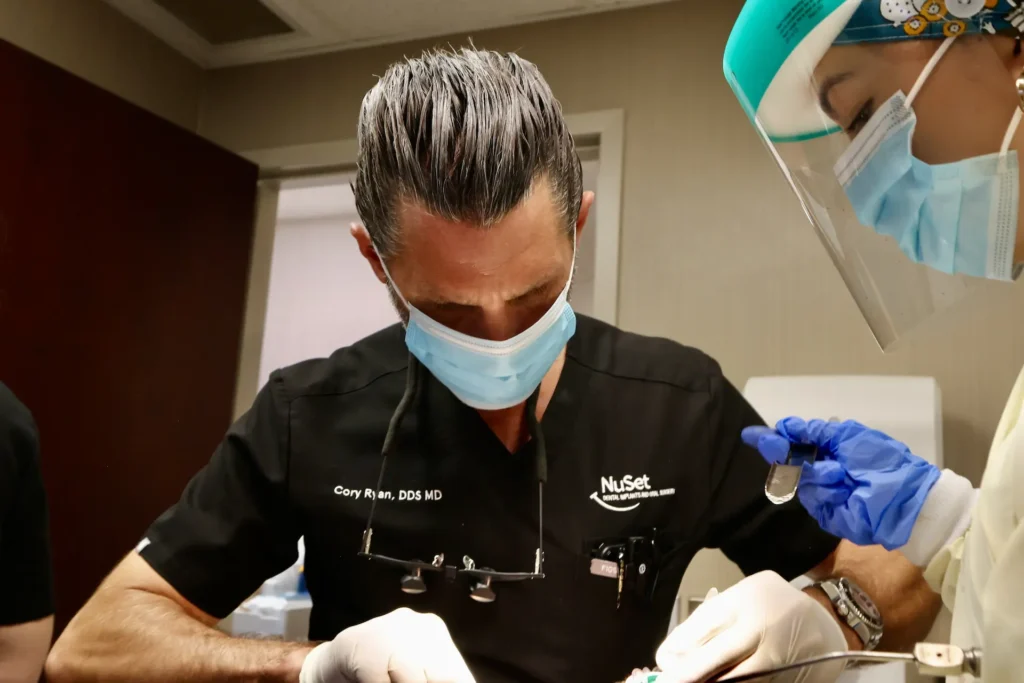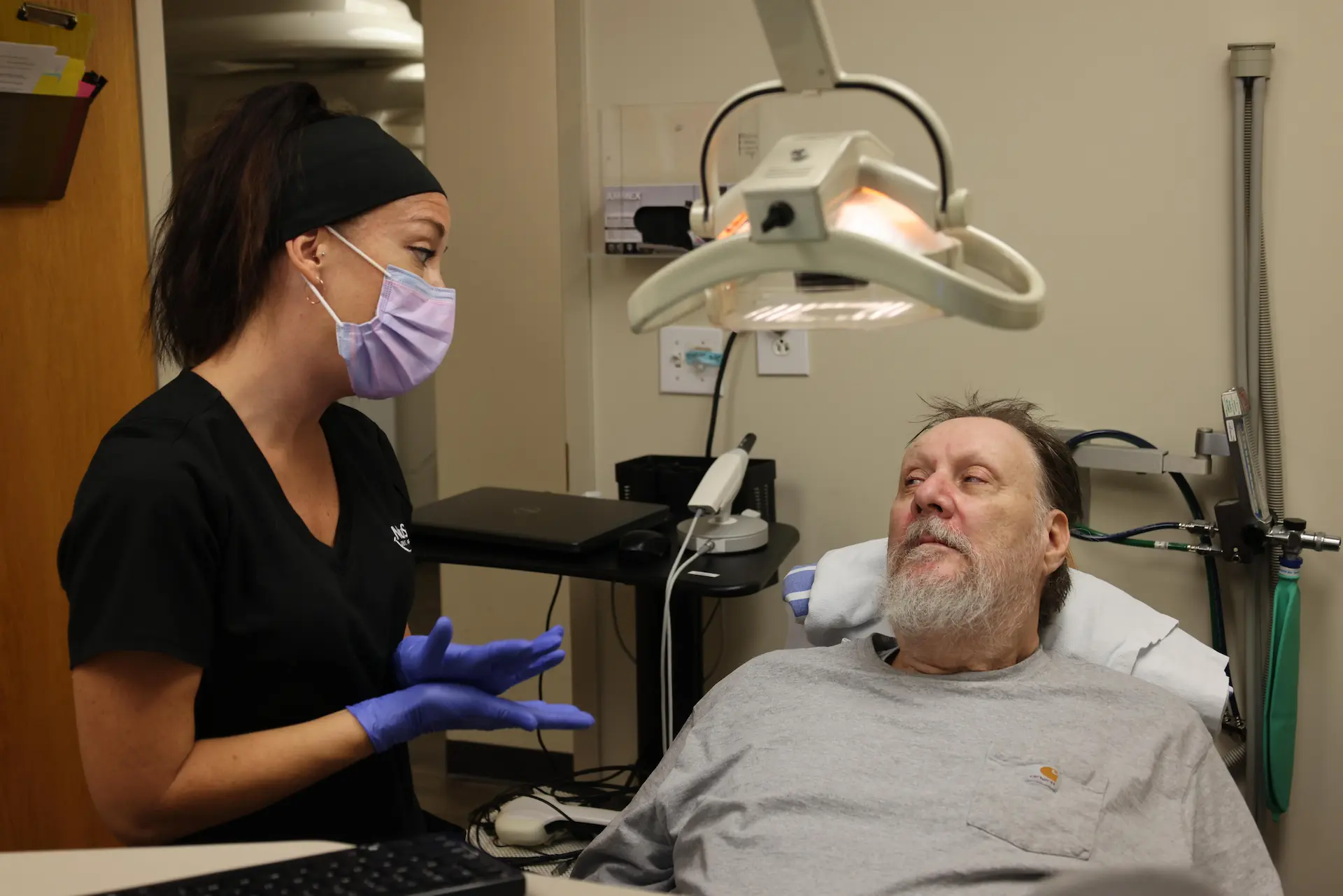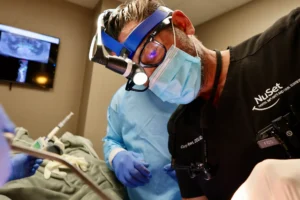If you’ve recently had dental implant surgery, you may be wondering, ‘When can I eat chips after dental implant surgery?’ While it’s tempting to reach for your favorite crunchy snack, it’s essential to follow your dentist’s guidelines to ensure proper healing.
Dental implants take 3-6 months to integrate with your jawbone and heal completely. During this time, the area around the implant may be more sensitive, and we can support healing by avoiding certain foods. Foods such as chips are hard and crunchy, which means they could put too much pressure on the implant site. They can also break into sharp pieces that might irritate your gums.
Keep reading to learn how long healing takes, why hard, crunchy foods can be risky, and when you can start eating them again. You’ll also find tips on how to protect your implant while enjoying your favorite snacks.
Key Takeaways
- Waiting 3 months before eating chips can help support your healing and your new dental implant.
- Healing after a dental implant takes 3-6 months. Your gums and bones need time to fully recover.
- Chips are too hard and crunchy to eat right after surgery. They can put pressure on the implant, cause pain, or get stuck in the healing area.
- Stick to soft foods for the first few days. Eat mashed potatoes, yogurt, scrambled eggs, and soups to avoid irritating the implant site.
- You can slowly reintroduce firmer foods after 2–4 weeks. Start with softer textures before trying crunchy snacks.
- Most patients can eat hard food after 3–6 months. Your dentist will confirm when your implant is stable enough for harder foods.
What Happens During a Dental Implant Procedure?
Getting a dental implant is a simple step-by-step process. Your implant specialist places a small implant post in your jawbone to replace a missing tooth root, and then places an abutment and restoration to match your natural teeth. For most patients, this can be done in just one day. Over time, your bone fuses with the implant.
Here are the steps in detail:
Step 1: Placing the Implant
At NuSet, we offer a variety of sedation options to keep you as comfortable as possible. Our implant specialist will make a small incision in the gum to place the implant post.
Step 2: Attaching the Crown
The implant specialist will attach an abutment—a small connector that holds the crown in place- to the implant post before placing your restoration. In most cases, the final crown or restoration can be placed on the same day as implant surgery, in some cases, your specialist may suggest a temporary crown while your mouth heals.
Whether permanent or temporary, your new restoration will look and feel natural. In cases where a temporary restoration is the best course of action, your specialist will secure a custom-made crown once your mouth is fully healed..
Step 3: Healing and Bone Growth
The real work happens under the surface as your bone starts integrating the implant in a process called osseointegration.
During this time, your mouth may still be sensitive. Hard or crunchy foods—like chips—can put pressure on the healing area so biting down too soon could slow healing.
How Long Does It Take for a Dental Implant to Heal?

Healing after a dental implant can be a smooth and comfortable process. While it may take time for your jawbone to fuse with the implant, your implant specialist will ensure you are comfortable throughout the whole process. This includes a guide on which food to eat to help with the healing process.
Initial Healing: The First Two Weeks
In the first 7 to 14 days, your body focuses on healing the soft tissues around the implant. Eating soft foods helps prevent irritation and protects the implant.
- Stick to foods like yogurt, mashed potatoes, scrambled eggs, smoothies, and soups.
- Avoid hard, crunchy, or sticky foods like chips, nuts, or chewy bread.
Biting into hard foods too soon can put pressure on the implant and slow healing.
Bone Healing and Osseointegration (3–6 Months)
After the first two weeks, healing moves deeper as your jawbone begins fusing with the implant.
During this time, your implant is still becoming as strong as a natural tooth. If you bite into something too hard, like a chip, you could put too much force on the implant. It’s best to wait until your dental specialist confirms the bone has fully healed before reintroducing hard foods.
Once you’re ready to start eating hard foods, break them into smaller pieces and chew carefully on the opposite side of your mouth.
Why Are Chips Not Ideal Right After Dental Implants?
Your gums are healing right after the dental implant procedure, and eating anything that requires a strong biting force can put pressure on the implant, disturbing the healing process.
Until your gums fully heal, food particles can easily get trapped around the implant. Chips break into small pieces that can settle into the surgical site, increasing the risk of bacteria buildup and infection.
When Can You Eat Chips After Dental Implant Surgery?
You need to give your mouth time to heal before eating crunchy foods like chips. The implant must bond with your jawbone, and your gums need to recover. Eating chips too soon can cause pain, irritation, or even damage the implant.
Timeline for Reintroducing Chips
First Few Days to 1 Week
Stick to soft foods like mashed potatoes, yogurt, and smoothies. Avoid anything crunchy, sticky, or hard. Your implant site is still healing, and biting into chips can cause discomfort.
2 to 3 Weeks
You may start eating slightly firmer foods, like soft bread, pasta, and cooked vegetables. Chips are still too hard at this stage and could put too much pressure on the implant.
1 to 3 Months
If your healing is going well, you might be able to introduce some crunchy foods, but avoid biting directly into chips.
6 Months or More
Once your specialist confirms that your implant has fully healed, you can eat chips again. But be mindful—chew slowly and avoid putting too much force on the implant site.
How to Take Care of Your Dental Implant During Recovery
Taking care of your implant after surgery is just as important as eating the right foods. Proper care helps prevent infections and ensures the implant heals correctly. Follow these simple steps to keep your implant safe and speed up recovery.
Post-Surgery Care Tips
- Keep your mouth clean: Brush gently with a soft-bristle toothbrush and use a non-alcoholic mouthwash.
- Rinse with salt water: This helps reduce swelling and keeps bacteria away. Use warm salt water 2–3 times a day.
- Take prescribed medications and attend all follow-up appointments.
- Avoid touching the implant site – Do not poke it with your tongue or fingers. This can slow healing and introduce bacteria.
- Stay away from straws – These can disturb the blood clot and delay healing.
Many people make small mistakes that can lead to complications. Avoid these:
- Skipping nutritious meals: Your body needs nutrients to heal, so eat soft, nutritious foods even if you don’t feel hungry.
- Smoking: Tobacco slows healing and increases the risk of implant failure.
- Ignoring dental visits: Your specialist will check if the implant is healing properly. Regular visits are important.
Protect your implant by following these tips, and you’ll be able to enjoy all your favorite foods again soon.
Get the Help You Need to Enjoy Your Favorite Foods Again!
Your implant needs time to heal before handling crunchy foods. Most patients can start reintroducing firmer foods after a few weeks, but chips should wait until your dentist gives the all-clear.
At NuSet Dental Implants and Oral Surgery, we specialize in expert implant care. Our team ensures your recovery goes smoothly so you can get back to eating comfortably and confidently. If you have questions about your healing process or when to reintroduce certain foods, book a consultation with us today. Let’s make sure your implant stays strong for years to come.
Frequently Asked Questions
How long after dental implants can I eat chips?
People can generally begin eating hard foods like chips after 3 months, but you should always check with your dental implant specialist before reintroducing hard or crunchy foods.
When can I eat crunchy food after a dental implant?
Crunchy foods like chips or nuts should be avoided during the initial healing phase, which lasts about 2–4 weeks. Most patients can start eating crunchy foods after their dental implant specialist confirms that healing is progressing well, usually after 3 months.
Can you eat chips after dental surgery?
It’s not a good idea to eat chips right after dental surgery. They are too hard and can irritate the surgical site, cause discomfort, or damage the implant. Stick to soft foods until your dental implant specialist gives you the go-ahead.
Can I eat French fries after dental implant surgery?
Yes, you can eat French fries if they are soft and not overly crispy. Avoid crunchy or hard fries during the first few weeks of recovery. Chew gently and avoid putting pressure on the implant site.





